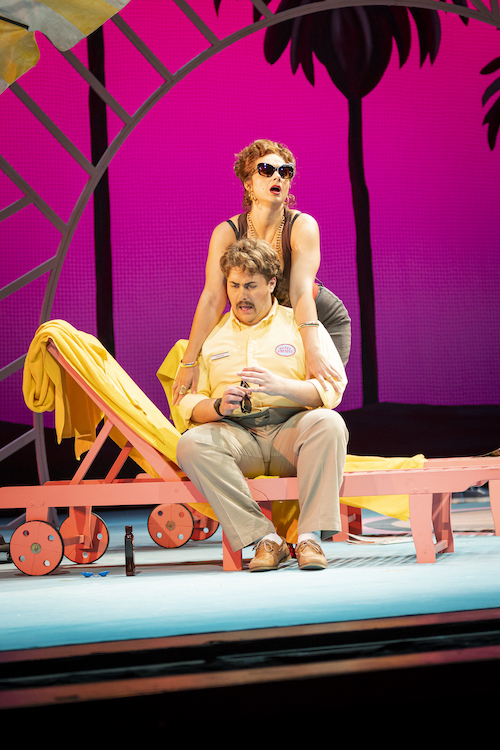FGO’s Miami-centric “Secret Marriage” does few favors for Cimarosa opera

Erin Alford (Aunt Fidalma) and Joseph McBrayer (Paolino) in Florida Grand Opera’s production of Cimarosa’s El matrimonio secreto. Photo: Eduardo Schneider
Revising an opera from past centuries to reflect an updated milieu and a current point of view can be a tricky and precarious undertaking.
Florida Grand Opera’s production of El matrimonio secreto attempts to put a feminist perspective on Domenico Cimarosa’s 1792 opus Il matriomonio segreto. While there is some amusing comedic interplay and worthy singing in this Spanish-language version, set in 1980s Hispanic Miami, FGO’s presentation ultimately fails to illuminate or enhance the original opera.
Director Elena Araoz and production creator Crystal Manich have set their scenario in Miami Beach where Cuban business entrepreneur Geronimo runs the trendy Hotel Paraio with his two daughters and widowed sister. Carolina, the younger daughter, has secretly married Paolino, the hotel’s valet and bellhop. Geronimo’s plan to marry off Elisetta, Carolina’s older sister, to Count Robinson (here a rich Caucasian dude) goes awry when the count is attracted to Carolina instead. Inevitable misunderstandings, jealousy and reconciliation ensue prior to a happy ending.
On the plus side, Benedetta Orsi and Darwin Aquino’s Spanish libretto works remarkably well with Cimarosa’s bubbly score, which at its most inspired slightly recalls the lighter operas of Mozart.
Still this update goes off the rails when the Count discusses a dowry. In the late twentieth century? Or as Elsietta sniffs cocaine (apparently) and starts wildly dancing across the stage, about to break into a lambada. The Count does pushups and appears bare chested in a poolside sequence, none of which matches the scenario nor the music.
These campy antics and distractions were more suggestive of a television sitcom than Cimarosa’s sophisticated opera buffa. Like Peter Sellars’ infamous production of Mozart’s Marriage of Figaro that placed its characters and scenario in Trump Tower, the comedy of 18th century manners and mores was incompatible with a 1980s’ urban America setting.
In addition to the unworkable updating, the opera has been massively cut. Perhaps Cimarosa’s three-hour opera could use some judicious trimming for modern audiences but around forty five minutes has been shorn from the score (for a complete running time of two hours and thirty-five minutes including intermission). Some of the cuts are awkwardly done and leave bumpy musical transitions, especially in Act II.
Darwin Aquino, a former FGO assistant conductor, led a lively, fast-paced reading of Cimarosa’s elegant work but brass too often overwhelmed the ensemble and singers, particularly in Act I. Balances were better calibrated in the second half.
As Carolina, Vanessa Becerra lit up the stage with an enchanting light soubrette voice, pinpoint coloratura and a perky presence. Her two smoothly sung arias proved the vocal high points of the evening.
Becerra blended to felicitous effect with the ardent Paolino of Joseph McBayer. His lyric tenor effectively projected both anguish at losing Carolina to the Count and joy at love’s eventual triumph.
Phillip Lopez assayed the deep bass notes and rapid patter of Geronimo with pizzazz, and his confused facial expressions were genuinely funny. As his sister Fidalima, Erin Alford, statuesque and spunky, brought apowerful mezzo and exhibited the best sense of classical style in the cast.
Michael Pandolfo played Count Robinson as a Hollywood celebrity, charismatic and arrogant. His baritone sounded smooth and solid in ensembles but weak and lightweight in solo arias.
Catalina Cuervo was miscast as Elisetta. The Columbian soprano possess a penetrating, multihued instrument with a slight edge at the top and in the right repertoire, she can be highly effective. Yet Cuervo’s mock mad scene near the conclusion amounted to a caricature of opera singing. She was more effective in the ensemble numbers, where her burnished timbre melded adroitly with her colleagues.
Many Spanish-speaking members of the audience found the adaptation amusing and entertaining. But this was a Secret Marriage that sorely failed to capture the letter or the spirit of Cimarosa’s vision.
Florida Grand Opera repeats El matrimonio secreto 7:30 p.m. Tuesday at the Arsht Center in Miami. fgo.org
Posted in Performances
3 Responses to “FGO’s Miami-centric “Secret Marriage” does few favors for Cimarosa opera”
Leave a Comment
Mon Nov 14, 2022
at 1:25 pm
3 Comments


Posted Nov 14, 2022 at 1:44 pm by Desi Diser
I am afraid I disagree with Mr. Budmen’s review. Does he speak Spanish? The Spanish text was a disaster, full of incoherent words and sentences, plus some pretentiously funny ones (“I have an orgasm in my heart”) It never made sense.
As a Latino I feel this is a disservice to us and to the opera genre. Very disappointing. Not even funny, plus long and boring.
Posted Nov 14, 2022 at 6:36 pm by Juan Morales
I completely agree with the earlier comment. The translation might have worked with the music, but for those of us who speak Spanish, it was “clunky” at best. Words that did not make sense and phrases that were far from grammatically correct.
Personally, I feel Opera is the top entertainment form. This production would not even qualify for musical theater. The set looked like a reject from the Gloria Estefan musical and given there was only one set and 6 singers (no chorus) the least they could have done was give the singers a change of costume or two. That outfit Elisetta had, it’s no wonder the Count did not fall for her at first sight!
Thank God for the vocals, and the orchestra which were top notch. Otherwise, this would have been another bad night at the opera. Judging from the number of empty seats on Saturday I don’t know for how long will FGO be able to keep it up.
Posted Nov 17, 2022 at 5:37 pm by Wolfgang731
To me, the question that lingers most is: What was the point of this entire production? Why Cimarosa? How exactly does Il Matrimonio Secreto lend itself to the whole premise? Why commission a Spanish-language translation if, ultimately, it doesn’t really make any artistic difference or add to its enjoyment?
Is the company seriously listening to or speaking with its audience and, if so, is this production the result of those conversations? Is this truly what the FGO audience wants or is the company just assuming that this is what they want? In the end it just seems like a gamble that truly didn’t pay off, regardless of all the effort made and talent involved.
Susan Danis has done an amazing job and should be commended for it.After Heuer’s moribund and lackluster tenure that resulted in an almost $20 million dollar crippling deficit for the company, Susan’s leadership in righting that financial ship and reducing said deficit to almost zero should be regarded as a miracle and not something to be easily ignored.
Furthermore, she’s added some fantastic and unique works in first-rate productions to the company’s repertoire, among them Mourning Becomes Electra, The Passenger, A Streetcar Named Desire, Orfeo ed Euridice, Agrippina, The Counsel and Florencia en el Amazonas, among others. But there have been some not-so-great productions and it would appear that El Matrimonio Secreto is among that lot, no offense to Cimarosa, a witty and charming composer.
Opera is a difficult proposition and an expensive one at that. Art organizations nationwide are experiencing difficulties especially in a post pandemic financial landscape and that’s unfortunate. Even the colossus that is the Chicago Symphony Orchestra is oftentimes playing to half-full houses. Washington National Opera presented only one mainstage production in 2021-2022 at Kennedy Center.
To make such a wager when the stakes are so high doesn’t make sense.